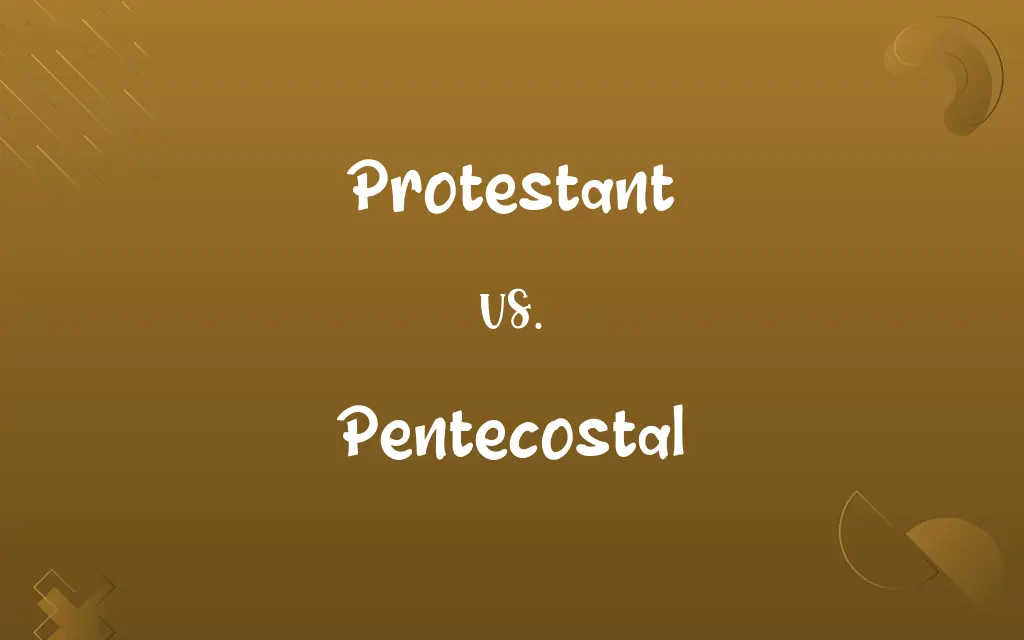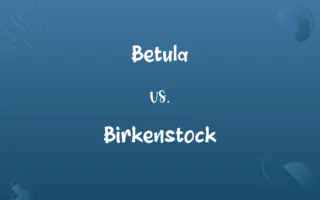Protestant vs. Pentecostal: Know the Difference

By Shumaila Saeed || Published on February 11, 2024
Protestantism is a major branch of Christianity born from the Reformation, while Pentecostalism is a charismatic Protestant movement emphasizing direct personal experience with God.

Key Differences
Protestantism, emerging during the 16th-century Reformation, is a diverse branch of Christianity that broke away from the Roman Catholic Church, rejecting its authority and certain doctrines. Pentecostalism, a subset of Protestantism, originated in the early 20th century and focuses on the direct experience of God through the baptism of the Holy Spirit, speaking in tongues, and divine healing.
Shumaila Saeed
Feb 11, 2024
The theological foundation of Protestantism includes the principles of sola scriptura (scripture alone) and sola fide (faith alone), emphasizing that salvation is achieved through faith in Jesus and not by works. Pentecostalism, while holding these core Protestant beliefs, uniquely emphasizes the gifts of the Holy Spirit as a current and active part of Christian life.
Shumaila Saeed
Feb 11, 2024
Protestant churches vary widely in worship style, ranging from liturgical to non-liturgical, with a focus on biblical preaching and teaching. Pentecostal worship is known for its vibrant and expressive nature, including lively music, speaking in tongues, prophecy, and healing services, reflecting their belief in the Holy Spirit's active presence.
Shumaila Saeed
Feb 11, 2024
Protestantism's impact on Christianity includes fostering denominational diversity, promoting religious freedom, and influencing various aspects of society and culture. Pentecostalism has been notable for its rapid growth globally, particularly in Latin America, Africa, and Asia, attracting followers with its dynamic worship and emphasis on spiritual experiences.
Shumaila Saeed
Feb 11, 2024
In terms of governance, Protestant churches can be either episcopal (governed by bishops), presbyterian (governed by elected elders), or congregational (autonomous). Pentecostal churches often feature charismatic leadership and may lean towards congregational or denominational governance, emphasizing the authority and guidance of the Holy Spirit.
Shumaila Saeed
Feb 11, 2024
ADVERTISEMENT
Comparison Chart
Core Beliefs
Sola scriptura, sola fide
Gifts of the Holy Spirit, speaking in tongues
Shumaila Saeed
Feb 11, 2024
Worship Style
Varies from liturgical to non-liturgical
Vibrant, expressive with emphasis on spirituality
Shumaila Saeed
Feb 11, 2024
Global Impact
Diverse denominations, religious freedom
Rapid growth, particularly in developing countries
Shumaila Saeed
Feb 11, 2024
Church Governance
Episcopal, presbyterian, or congregational
Often congregational or denominational
Shumaila Saeed
Feb 11, 2024
ADVERTISEMENT
Protestant and Pentecostal Definitions
Protestant
Protestantism encompasses various denominations.
As a Protestant, I have a choice of several denominations to join.
Shumaila Saeed
Jan 13, 2024
Pentecostal
Pentecostalism is a charismatic Christian movement.
The Pentecostal church service was filled with lively worship.
Shumaila Saeed
Jan 13, 2024
Protestant
Protestantism values religious freedom and diversity.
Protestantism played a key role in promoting religious freedom.
Shumaila Saeed
Jan 13, 2024
Pentecostal
Pentecostalism is known for its dynamic and expressive worship.
Pentecostal worship services are often vibrant and emotional.
Shumaila Saeed
Jan 13, 2024
Protestant
Protestant churches emphasize faith and scripture.
In Protestant belief, salvation is by faith alone.
Shumaila Saeed
Jan 13, 2024
ADVERTISEMENT
Pentecostal
Pentecostalism focuses on direct spiritual experiences.
Pentecostals seek a personal encounter with God through the Holy Spirit.
Shumaila Saeed
Jan 13, 2024
Protestant
Protestant refers to a branch of Christianity that emerged from the Reformation.
The Protestant church I attend focuses on scripture-based sermons.
Shumaila Saeed
Jan 13, 2024
Pentecostal
Pentecostals emphasize the baptism of the Holy Spirit.
Pentecostals believe in receiving the Holy Spirit with speaking in tongues.
Shumaila Saeed
Jan 13, 2024
Protestant
A member of a Western Christian church whose faith and practice are founded on the principles of the Reformation, especially in the acceptance of the Bible as the sole source of revelation, in justification by faith alone, and in the universal priesthood of all the believers.
Shumaila Saeed
Jan 12, 2024
Protestant
A member of a Western Christian church adhering to the theologies of Luther, Calvin, or Zwingli.
Shumaila Saeed
Jan 12, 2024
Pentecostal
Of, relating to, or being any of various Christian religious congregations whose members seek to be filled with the Holy Spirit, in emulation of the Apostles at Pentecost.
Shumaila Saeed
Jan 12, 2024
Protestant
One of the German princes or cities that supported the doctrines of Luther and protested against the decision of the second Diet of Speyer (1529) to enforce the Edict of Worms (1521) and deny toleration to Lutherans.
Shumaila Saeed
Jan 12, 2024
Protestant
Protestant (also prə-tĕstənt) One who makes a declaration or avowal.
Shumaila Saeed
Jan 12, 2024
Protestant
Alternative case form of Protestant
A protestant effort
Protestant work ethic
Shumaila Saeed
Jan 12, 2024
Pentecostal
Of or relating to or characteristic of any of various Pentecostal religious bodies or their members
Shumaila Saeed
Jan 12, 2024
Pentecostal
Pentecostal worship includes speaking in tongues and healing.
Speaking in tongues is a common practice in Pentecostal congregations.
Shumaila Saeed
Jan 13, 2024
Protestant
One who protests; - originally applied to those who adhered to Luther, and protested against, or made a solemn declaration of dissent from, a decree of the Emperor Charles V. and the Diet of Spires, in 1529, against the Reformers, and appealed to a general council; - now used in a popular sense to designate any Christian who does not belong to the Roman Catholic or the Greek Church.
Shumaila Saeed
Jan 12, 2024
Protestant
Of or pertaining to the faith and practice of those Christians who reject the authority of the Roman Catholic Church; as, Protestant writers.
Shumaila Saeed
Jan 12, 2024
Protestant
Of or relating to Protestants or Protestantism;
Protestant churches
A Protestant denomination
Shumaila Saeed
Jan 12, 2024
Protestant
Protestantism led to religious reforms in the 16th century.
Protestant reformers challenged the practices of the Catholic Church.
Shumaila Saeed
Jan 13, 2024
Repeatedly Asked Queries
Are all Protestants Pentecostal?
No, Pentecostalism is a subset of Protestantism, and not all Protestants are Pentecostal.
Shumaila Saeed
Feb 11, 2024
Do Pentecostals follow the Bible strictly?
Yes, Pentecostals adhere closely to the Bible, emphasizing the New Testament's teachings.
Shumaila Saeed
Feb 11, 2024
How do Protestant churches differ in worship?
Protestant worship styles range from traditional and liturgical to contemporary and non-liturgical.
Shumaila Saeed
Feb 11, 2024
What defines Protestant Christianity?
Protestant Christianity is defined by its emphasis on scripture and faith, originating from the Reformation.
Shumaila Saeed
Feb 11, 2024
Do Protestants believe in saints?
Protestants respect saints but do not venerate them as intercessors like in Catholicism.
Shumaila Saeed
Feb 11, 2024
What are key beliefs of Pentecostalism?
Pentecostalism is characterized by beliefs in the baptism of the Holy Spirit, speaking in tongues, and divine healings.
Shumaila Saeed
Feb 11, 2024
Do Protestants have a central religious authority?
No, Protestant churches typically do not have a single central authority like the Pope in Catholicism.
Shumaila Saeed
Feb 11, 2024
Is Pentecostalism growing globally?
Yes, Pentecostalism is one of the fastest-growing segments of Christianity worldwide.
Shumaila Saeed
Feb 11, 2024
What makes Pentecostal worship distinct?
Pentecostal worship is known for its expressiveness, including lively music, speaking in tongues, and healing services.
Shumaila Saeed
Feb 11, 2024
What denominations are included in Protestantism?
Protestantism includes denominations like Baptist, Methodist, Lutheran, and Presbyterian.
Shumaila Saeed
Feb 11, 2024
What role does the Holy Spirit play in Pentecostalism?
The Holy Spirit is central to Pentecostal belief, seen as actively working in believers' lives.
Shumaila Saeed
Feb 11, 2024
What is the Protestant view on salvation?
Protestants generally believe salvation is through faith in Jesus Christ alone, not by works.
Shumaila Saeed
Feb 11, 2024
Can anyone become a Protestant?
Yes, Protestant churches are open to all who wish to join and profess faith in Jesus Christ.
Shumaila Saeed
Feb 11, 2024
Are Protestant churches autonomous?
Many Protestant churches are autonomous or governed by a local or regional body, not a central hierarchy.
Shumaila Saeed
Feb 11, 2024
Is speaking in tongues essential in Pentecostalism?
Speaking in tongues is a common practice and is often seen as evidence of the Holy Spirit's presence in Pentecostalism.
Shumaila Saeed
Feb 11, 2024
Are miracles a part of Pentecostal belief?
Yes, Pentecostals believe in and often claim to witness miracles as part of their faith.
Shumaila Saeed
Feb 11, 2024
How do Pentecostals view other Christian denominations?
Pentecostals generally view other Christians positively but emphasize the importance of charismatic experiences.
Shumaila Saeed
Feb 11, 2024
How important is church attendance for Pentecostals?
Church attendance is very important for Pentecostals, emphasizing communal worship and fellowship.
Shumaila Saeed
Feb 11, 2024
Do Pentecostals have specific dress codes for services?
Dress codes vary among Pentecostal churches; some may have specific guidelines, while others are more relaxed.
Shumaila Saeed
Feb 11, 2024
What sacraments do Protestants observe?
Most Protestant denominations recognize two sacraments: baptism and the Lord’s Supper.
Shumaila Saeed
Feb 11, 2024
Share this page
Link for your blog / website
HTML
Link to share via messenger
About Author
Written by
Shumaila SaeedShumaila Saeed, an expert content creator with 6 years of experience, specializes in distilling complex topics into easily digestible comparisons, shining a light on the nuances that both inform and educate readers with clarity and accuracy.









































































